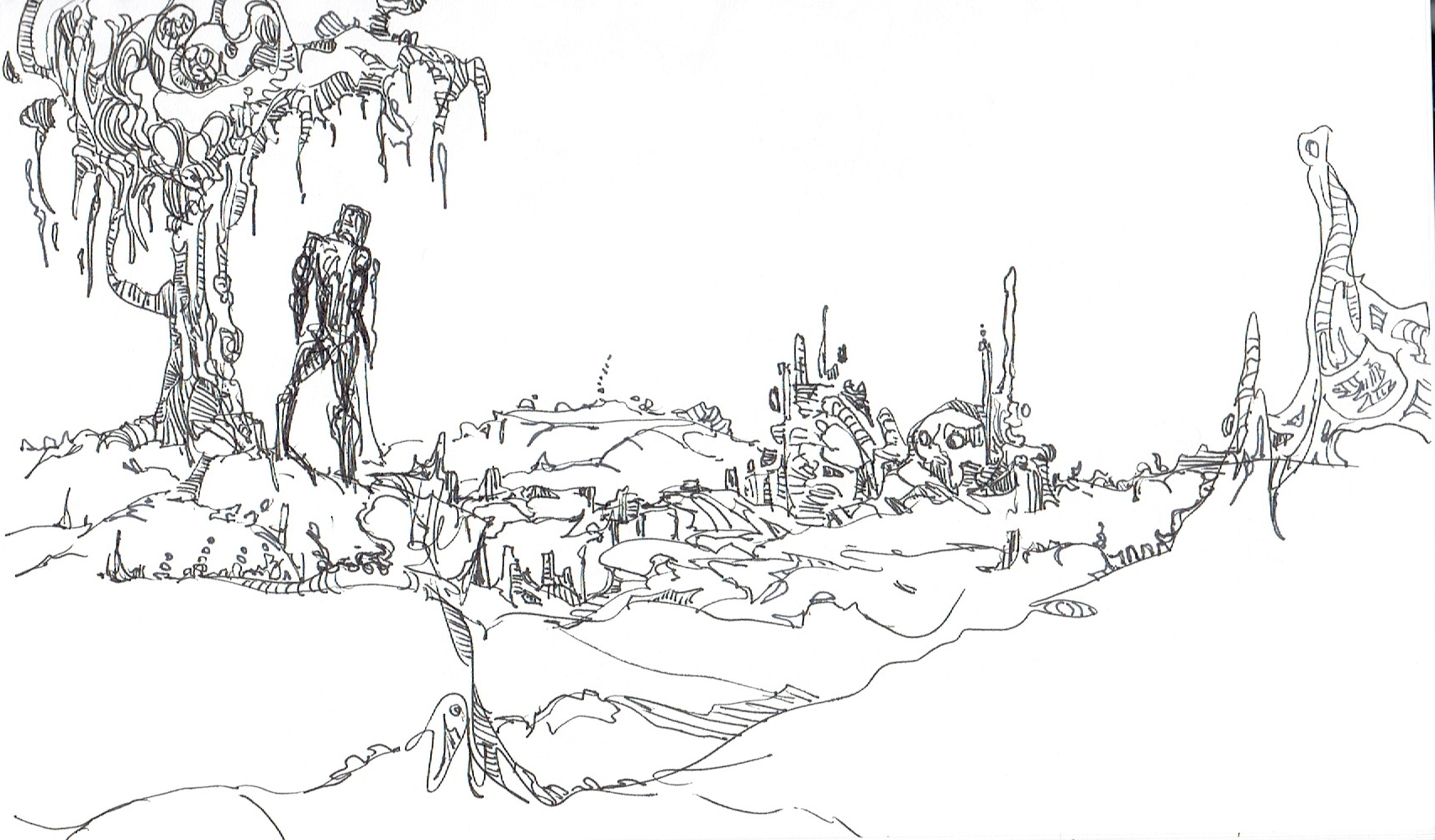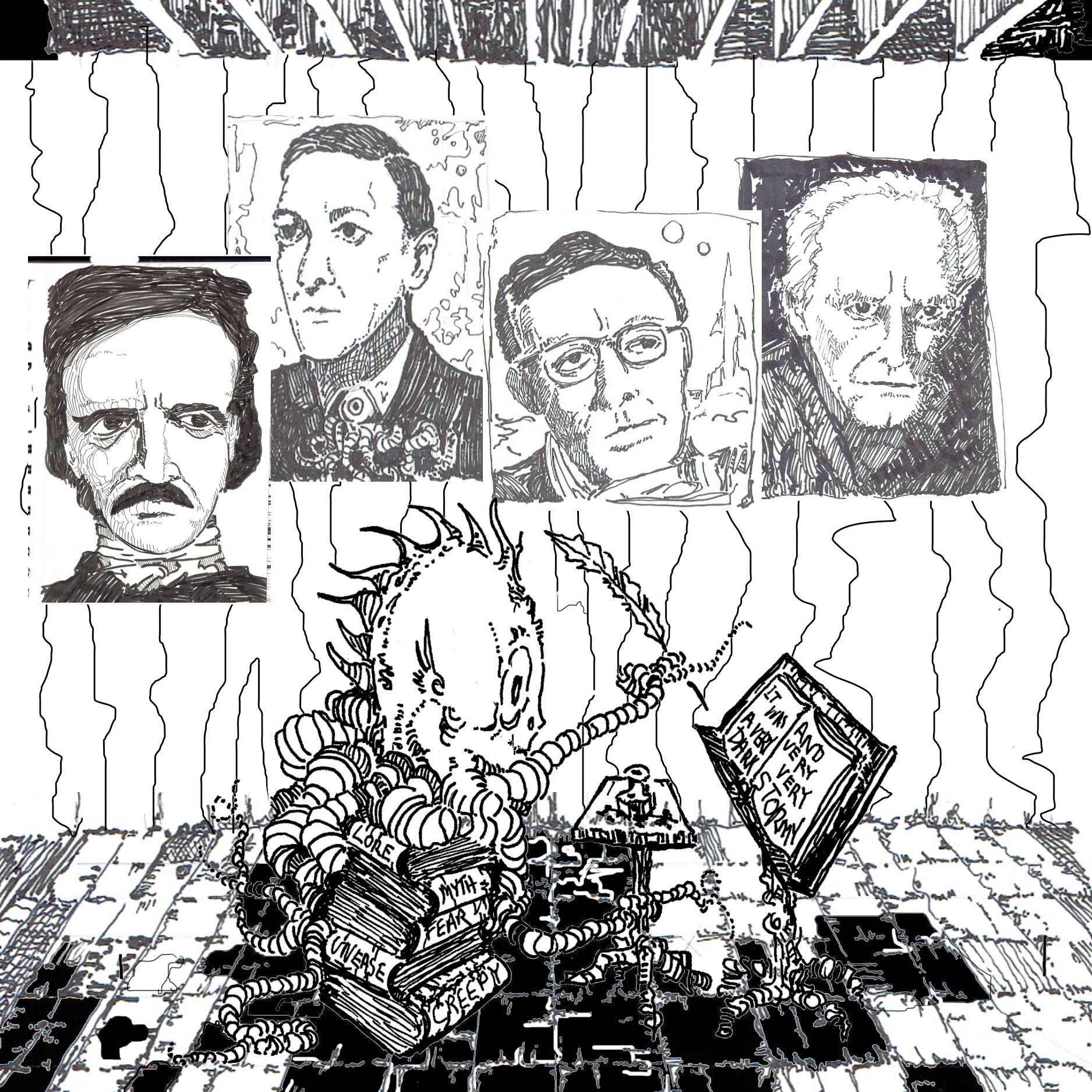Sometimes a book can be like a seed — so much depends on where and when and how it lands. For example, Catcher in the Rye is best experienced right around adolescence, preferably in a school library during after-school detention. The Bridges of Madison County is probably best read (by a man anyway) the first time he can’t for a second time, NOT the second time he can’t for the first time.
This past week I had the pleasure of reading The Goblin Reservation by one of my all-time favorite writers, Clifford D. Simak, and the circumstances couldn’t have been better.
I spent a week at a cabin in the woods in a little State Park which is miles away from any cell phone coverage, internet, tv or radio broadcast signals. I didn’t take an alarm clock. Evenings were spent around a small outdoor fire; afternoons were spent swimming or boating in a lake so clear one could easily see every rock on the bottom. Mornings I sat on a stone porch with my wife and my dog, drinking coffee, either sketching the old growth forest that shaded us, or dragging the rocking chair into a sunny patch to read some of the tattered paperbacks I brought with me, including the 1968 novel, The Goblin Reservation, (hereafter TGR).
Like many Simak novels, TGR ignores the template which was in fashion in early science fiction that advised authors to only build the story around one single impossible concept at a time. Simak felt perfectly comfortable cooking a fictional casserole with a dozen or so elements; in this case time travel, alien beings, inadvertent duplication through teleportation, bio-mechanical chimera, supernatural beings from folklore such as trolls and goblins, ghosts, and hostile and mysterious alien races (both from outer space and from ancient epochs in Earth’s history). It’s to Simak’s credit that he can weave such a complicated skein of concepts into one narrative, yet never devolve into confusion. I credit his wiry midwestern mettle, as well as his decades of experience as a newspaperman.
The story moves at a brisk pace, and involves a “Professor of the Supernatural,” Peter Maxwell, who is informed in chapter one that he was unwillingly “duplicated” on a recent teleportation trip. The “other” Peter Maxwell (or maybe the “original;” it’s a moot point) arrived as scheduled but was killed. The character we’re following has a memory of being diverted to an unknown, mysterious planet, where he encountered a race of incomprehensible super-beings, curators of a store of knowledge that dwarfs even that of the galactic civilization. Their motivations are a complete mystery to Maxwell, but it soon becomes apparent that his experience is somehow key to unraveling political and financial intrigues on the far-future Earth.
All this intrigue unfolds in cozy fashion in and around Maxwell’s home habitat, “The College of Supernatural Phenomena on Wisconsin Campus.” Earth of the far future is a University planet, and the Wisconsin campus is conveniently just a short hop from The Goblin Reservation of the title, a kind of game reserve where fairies and trolls and such live their pastoral life away from the hustle and bustle of humans.
It’s worth noticing that as the story moves along, Simak has Peter Maxwell interacting with various fairy folk, lovingly drawn characters with whom he enjoys mutual respect, and as well as with the various human characters one might find around a university — dilletantes, bumbling administrators, schemers, noble but scatter-brained academics, etc.
Maxwell’s inner circle includes an actual ghost and a Neanderthal retrieved from caveman days and brought to the University. Even Carol Hampton, the female who Maxwell “meets cute” and who throws in with his band is a person who is most interesting in the fact that she is always accompanied by a “bio-mechanical” saber-tooth tiger named Sylvester, who is designed to inject some comedy into the story by stealing steaks and frightening villains. Actual human beings in this story are crude, almost stereotypical, but the fantasy creatures feel more robust. It’s as if Simak, after decades as a newspaperman, found real life people repetitious and mundane.
Another aspect of this book which suggests the dichotomy of Simak’s spiritual/ intellectual nature is the fact that he envisions Earth in the far future as a pastoral setting, of lakes and forests and clean orderly parks, interspersed with unobtrusive and sparsely described mechanical roads and spaceports. And when Maxwell gazes out at this world, he imagines (as I suspect Simak himself did in Midwest Lake Country where he spent most of his life) the world of Deep Time, a world in which Humanity and its concerns struggle for significance against a backdrop of vastly more ancient, more intelligent beings.
This was the Clifford Simak who found, in the spirit of quiet and unassuming men who sat on porch rockers or who strolled along forest paths, deep connections to the primeval spirits and pageantry of an uncaring world unfolding with agonizing deliberation. This was the Clifford Simak steeped in archaeology and paleontology, who in the coming decade of the 70’s would write about Lovecraftian horrors plaguing the dinosaurs in “The Whistling Well” and the wistful wonder of a doodling cave dweller in “Grotto of the Dancing Deer.”
TGR met an enthusiastic reception in the science fiction readership of the time, being a Hugo award finalist (losing out to John Brunner’s visionary population-explosion dystopia Stand on Zanzibar, perhaps because readers of that time felt it would be just a little bit unserious, elevating Simak’s “merry romp” of a novel above a dour extrapolation of the catastrophe which is human existence). In the next decade Simak would survey more of the intellectual and spiritual landscape which lies between science fiction and fantasy, with novels like Enchanted Pilgrimage and Fellowship of the Talisman.
It would be easy for a modern reader to read The Goblin Reservation and find it “unserious” or dated, naïve or quaint. If you can find time to rest on a rocking chair on the porch of a cabin in the old woods — or even if you can only achieve that mindset — you’ll find it a rewarding experience.


